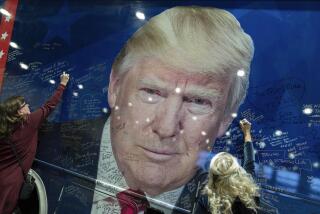It’s Kids Who Will Miss Perot : Campaign ‘96: Voters under 30 may stay home if he’s excluded from debates.
- Share via
As the controversy rages over the decision to bar Ross Perot from this year’s presidential debates, one group of voters--Americans under 30--are among the most disappointed. They, after all, have consistently been Perot’s greatest supporters.
In 1992, a whopping 22% of voters between the ages of 18 and 29 threw their support behind Perot, as compared with 19% among voters of all age groups. Such a bent can be seen at work again this year, with polls showing Perot receiving twice the support among younger voters than he does overall. Indeed, one major survey of the under-30 age group, conducted in July by the Garin-Hart-Yang Research Group, showed the Texas billionaire not only receiving levels of support similar to 1992, but actually beating (yes, beating) Bob Dole in the key swing states of Michigan and New Jersey.
Even now, with Perot’s numbers down to a mere 5%, according to some surveys, he is still pulling in double-digit levels of support among the 18 to 29-year-old crowd. With this in mind, the impact of excluding Perot from the debates becomes even greater. To keep him off the national stage is to risk alienating a significant number of America’s newest voters, many of whom may now be more likely not to participate this November.
Such an impact would not only be detrimental to the democratic process, but could also prove devastating to the gradually emerging political voice of today’s post-baby boom generation of Americans, one which will be taken seriously by politicians only to the extent that voter turnout among the young remains high.
The last presidential election appeared to mark the beginning of a resurgence in youth participation in the political process. Nearly half of eligible voters under 30 cast ballots, the highest level in 20 years. But 1994 was far less encouraging. Youth turnout fell to a dismal 12%, explained away by experts as simply the product of midterm elections in which turnout among all age groups is typically low.
But this time around, there won’t be any good excuses if young people don’t vote. Which is why anything that can help energize this group and send it to the polls on Nov. 5 is of tremendous value. Ross Perot’s candidacy will do just that. Allowing him to participate in nationally televised debates is an indispensable part of the process.
More to Read
Get the L.A. Times Politics newsletter
Deeply reported insights into legislation, politics and policy from Sacramento, Washington and beyond. In your inbox twice per week.
You may occasionally receive promotional content from the Los Angeles Times.










